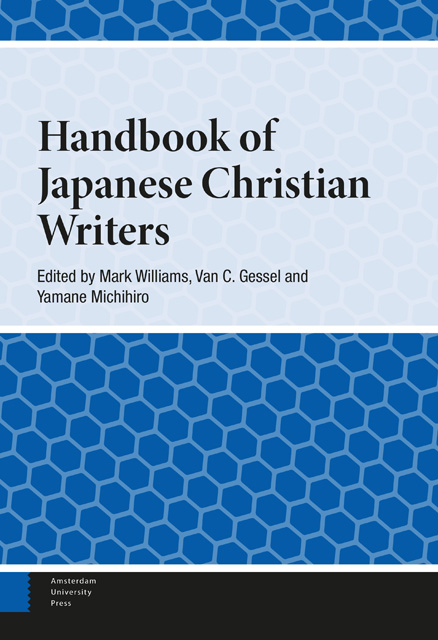Book contents
- Frontmatter
- Contents
- Contributors
- Abbreviations
- Preface
- Introduction
- 1 Prophet of the Inner Life: Kitamura Tōkoku
- 2 Shimazaki Tōson and Christianity: When the Cherries Ripen in the Taishō Period
- 3 Arishima Takeo and Christianity
- 4 Akutagawa Ryūnosuke: A Christian Life
- 5 Incarnation of the Christian Faith in the Poetry of Yagi Jūkichi
- 6 Hori Tatsuo: The Cross Dyed in Bloody Red and the Little Gods of Ancient Times
- 7 Nagai Takashi on Divine Providence and Christian Self-Surrender: Towards a New Understanding of hansai
- 8 Dazai Osamu: His Wrestle with the Bible
- 9 Shiina Rinzō: His Two Visages
- 10 From out of the Depths: Shimao Toshio’s Literary Response to Adversity
- 11 Yasuoka Shōtarō and Christianity: From Postwar “Emptiness” to Religious Longing
- 12 Miura Ayako and the Human Face of Faith
- 13 Endō Shūsaku and the Compassionate Companionship of Christ
- 14 Ogawa Kunio: Renewal of Faith and Identity in His seishomono (Bible Stories)
- 15 Kaga Otohiko: In Search of What Lies Beyond Death
- 16 Sono Ayako: Amor Vincit Omnia
- 17 Takahashi Takako: Drawing Closer to God Through Literature
- Index
- Index of titles
11 - Yasuoka Shōtarō and Christianity: From Postwar “Emptiness” to Religious Longing
Published online by Cambridge University Press: 09 June 2023
- Frontmatter
- Contents
- Contributors
- Abbreviations
- Preface
- Introduction
- 1 Prophet of the Inner Life: Kitamura Tōkoku
- 2 Shimazaki Tōson and Christianity: When the Cherries Ripen in the Taishō Period
- 3 Arishima Takeo and Christianity
- 4 Akutagawa Ryūnosuke: A Christian Life
- 5 Incarnation of the Christian Faith in the Poetry of Yagi Jūkichi
- 6 Hori Tatsuo: The Cross Dyed in Bloody Red and the Little Gods of Ancient Times
- 7 Nagai Takashi on Divine Providence and Christian Self-Surrender: Towards a New Understanding of hansai
- 8 Dazai Osamu: His Wrestle with the Bible
- 9 Shiina Rinzō: His Two Visages
- 10 From out of the Depths: Shimao Toshio’s Literary Response to Adversity
- 11 Yasuoka Shōtarō and Christianity: From Postwar “Emptiness” to Religious Longing
- 12 Miura Ayako and the Human Face of Faith
- 13 Endō Shūsaku and the Compassionate Companionship of Christ
- 14 Ogawa Kunio: Renewal of Faith and Identity in His seishomono (Bible Stories)
- 15 Kaga Otohiko: In Search of What Lies Beyond Death
- 16 Sono Ayako: Amor Vincit Omnia
- 17 Takahashi Takako: Drawing Closer to God Through Literature
- Index
- Index of titles
Summary
The spiritual journey of Yasuoka Shōtarō culminated in his baptism in his late years. As he pursued a consistent confrontation with the existential issue of postwar “emptiness,” Yasuoka developed a religious longing for a being that could envelop that “emptiness.” That religious longing is evident in his pre-conversion writings, including his most representative work, Tales of Homeless Wandering, which reflects Yasuoka's own experiences of defeat in war. Yasuoka's writings relating directly to issues surrounding Christianity, as well as statements by his friends and family members, trace the path that led him to baptism. The religious world of Yasuoka's late years was enlarged through his encounter with Christianity, locating the apex of his literature as he continued to depict the “emptiness” of the postwar period.
Introduction
Yasuoka Shōtarō (1920–2013) was baptized into the Catholic Church at the age of 68 by Father Inoue Yōji, with his friend, the Catholic author Endō Shūsaku, acting as godfather. Baptized in the later years of his life, the relationship that Yasuoka had with Christianity was considerably different from those of many young authors in the Meiji and Taishō periods who were drawn to Christianity and received baptism into Protestant denominations but ultimately left the church after experiencing various conflicts. The trajectory for Yasuoka resembles something of a pilgrimage, over the course of which his awareness of a religious longing in his life deepened.
There was no particular religious background that was fully practiced in the home where Yasuoka spent his childhood, and his conscription into the military during his adolescent years meant that the War prevented him from forming a sense of selfhood. As a result of the chest ailment he contracted in the battlefield, he developed spinal caries, and for a time after the War ended, he was forced to spend all his time lying in bed. In those instances, Yasuoka experienced feelings of emptiness. It was a time when many Japanese could not believe in any philosophy or ideology—let alone religion—and sensed a “spiritual void” (Yasuoka 2018, 365). As he lay on his sickbed, questioning whether perhaps his life had no meaning, he began to write from his prone position in order to confirm that he actually was alive. His debut work was “Garasu no kutsu” (Glass Slipper,* 1951).
- Type
- Chapter
- Information
- Handbook of Japanese Christian Writers , pp. 189 - 206Publisher: Amsterdam University PressPrint publication year: 2022



